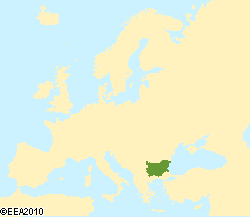Document Actions
Country profile - Societal developments

Since 1950, when it was an agrarian society, Bulgaria has gradually been changing into an agrarian/industrial nation. The amount of farmland has grown steadily since 1960 from 5 672 000 to 6 206 000 hectares in 1980. At the same time, agriculture has become more intensive, with average wheat yields growing from 190 kilos per decare (kg/dca)[1] in 1960 to 350 in 1980. Average corn yields increased from 236 to 483 kg/dca over the same period. The use of machinery, insecticides and mineral fertilisers has also increased significantly (Source: NSI - http://www.nsi.bg).
Between 1960 and 1980, electric power generation increased from 4 657 million kilowatt hours (mkwh) to 32 484 mkwh. Use of insecticides grew from 2 000 tonnes in 1960 to 16 874 tonnes in 1980 and use of nitrous fertiliser from 331 357 to 1 682 857 tonnes over the same period (Source: NSI - http://www.nsi.bg).
In 1989, Bulgaria embarked on a process of economic reform which progressed rather slowly throughout the first half of the 1990s. During this period, Bulgaria was affected by political instability in the West Balkans which hindered commercial links with western Europe. As a result, the country saw extremely low levels of investment, a loss of human potential due to emigration and an inefficient labour market, leading to one of the lowest per capita GDPs in Europe. The introduction of a currency board arrangement in 1997 helped to accelerate the transition to a functioning market economy, with market liberalisation, the privatisation and restructuring of state-owned companies and the deregulation of monopolies.
Bulgaria is now a stable country with a rapidly-developing market economy, however significant investment is still required in infrastructure, human capital and business development for this to become sustainable. The overall economic policy pursued since 1997 aims to achieve macroeconomic stability as a condition for high growth.
During its first year of EU membership, Bulgaria followed an economic policy that aimed to secure sustainable economic growth, a high rate of foreign and local investment, an increase in employment and dynamic convergence in incomes and prices. Yet, despite positive results, Bulgaria's economy is still one of the least-developed in the EU (http://www.government.bg).
In the period 2000-2007, Bulgaria maintained a relatively stable per capita GDP growth of around 6.4 % against an EU-27 average of 2 %. Preliminary data from the Bulgarian National Statistics Institute (NSI) indicates a GDP of BGN 56.5 billion (EUR 28.9 billion) for 2007 and a growth rate of 6.2 % on 2006. This gives Bulgaria a ranking of fifth place in the EU in terms of growth rates. Nevertheless, Bulgaria's per capita GDP is still only 32.1 % of EU-25 GDP (Source: NSI - http://www.nsi.bg).
The Bulgarian economy is still very energy-intensive and dependent on imported energy commodities. Due to a lack of primary energy sources, Bulgaria imports some 70 % of its energy. Productivity is low compared to the European Union average, indicating that further efforts are needed to boost efficiency and competitiveness.
[1] 10 dca = 1 hectare




